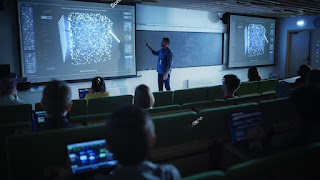- Get link
- X
- Other Apps
Let’s take a closer look at this transformative shift and see what it means for students, educators, and the very essence of education.
The Traditional Lecture Hall: A Relic of the Past?
For years, the traditional lecture hall has been the backbone of higher education. Students sat in rows, listening to professors deliver one-way lectures, absorbing information through note-taking. While this model has its merits, it often fails to fully engage students or cater to their diverse learning needs.
Enter AI-powered learning hubs. These innovative spaces break free from the rigid structures of traditional classrooms, fostering a more interactive and engaging educational experience. Imagine classrooms equipped with technology that adapts to individual learning styles, preferences, and paces. It’s not just a dream—it’s the future of learning.
Personalized Learning for Every Student
One of AI’s most powerful benefits in education is its ability to offer personalized learning experiences. Through sophisticated algorithms, AI can assess students' strengths, weaknesses, and progress, and tailor content to suit each individual’s needs.
For example, if a student struggles with a specific math concept, AI can offer targeted exercises, resources, and even virtual tutoring sessions to help them master the topic. This personalized approach ensures that every student receives the support they need to succeed, making learning more efficient and enjoyable.
Promoting Collaboration Through AI
Gone are the days of solitary learning. AI-driven learning hubs encourage collaboration among students, providing them with opportunities to work together on projects and share ideas. These spaces often feature interactive technologies such as virtual whiteboards, group brainstorming tools, and AI-powered discussion platforms.
Imagine a group of students collaborating on a research project while AI helps them gather data, identify trends, and propose innovative solutions. Not only does this enhance teamwork skills, but it also prepares students for the collaborative nature of the modern workplace.
Empowering Educators with Data-Driven Insights
While students benefit from personalized learning, educators also gain valuable insights from AI. By analyzing data on student performance, participation, and engagement, AI can help professors identify trends and adjust their teaching strategies accordingly.
For instance, if a significant number of students are struggling with a particular topic, the AI can flag this, enabling the professor to adjust the curriculum or offer additional resources. This data-driven approach allows educators to create more responsive and effective learning environments.
Flexible, Accessible Learning for All
AI-powered learning hubs also offer greater flexibility in how students access education. With online platforms, students can learn at their own pace, whether attending in-person classes or engaging with virtual lectures. This flexibility supports a wide range of learning preferences.
Moreover, AI can facilitate hybrid learning models that combine face-to-face and online instruction, catering to diverse learning styles. This adaptability also prepares students for a future where remote work and online collaboration are commonplace.
Preparing Students for the Future Job Market
As the job market evolves, many of the careers of tomorrow have yet to be created. To prepare students for this uncertain future, universities must focus on cultivating skills such as critical thinking, creativity, and adaptability.
AI-driven learning hubs encourage these skills by providing students with hands-on, real-world problem-solving opportunities. By fostering an environment that values innovation and experimentation, universities can equip students with the tools they need to succeed in an ever-changing world.
The Role of Faculty in an AI-Powered Education System
Although AI will play a central role in the future of education, it’s important to recognize the critical role faculty members will continue to play. Rather than being replaced by technology, professors will become facilitators—guiding students through their learning experiences and helping them navigate the wealth of resources available.
Professors can leverage AI to enhance their teaching methods, creating dynamic content that resonates with students. By integrating AI into their classrooms, educators can foster a culture of continuous learning and improvement, inspiring students to become lifelong learners.
Ethical Considerations in AI-Driven Education
As AI transforms the landscape of education, it’s essential to address the ethical implications of these technologies. Universities must prioritize data privacy and security, ensuring that students’ personal information remains protected and that AI algorithms are free from bias.
Moreover, universities must work to bridge the digital divide, ensuring that all students have access to the technology and resources necessary to thrive. By promoting inclusivity and equity, AI-powered learning hubs can benefit students from all backgrounds and circumstances.
A Promising Future for Higher Education
The future of university campuses is bright, with AI-driven learning hubs paving the way for more personalized, interactive, and collaborative educational experiences. As we move away from traditional lecture halls and into innovative learning environments, both students and educators will reap the benefits of these technological advancements.
By embracing AI, universities can create spaces that foster creativity, critical thinking, and problem-solving—skills that are crucial for success in today’s world. The journey is just beginning, and the possibilities are endless.
Stay tuned as we continue to explore the impact of AI on education. The future of learning is here, and it’s filled with exciting potential.
- Get link
- X
- Other Apps

Comments
Post a Comment